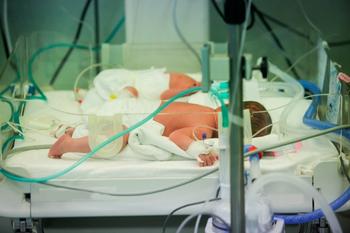
- Vol 67 No 3
- Volume 67
- Issue 3
Prenatal genetic data sharing and privacy risks
An oral abstract presentation at SMFM’s 42nd Annual Pregnancy Meeting explored cfDNA testing and participants’ knowledge and willingness of genetic data sharing.
“There has been a dramatic increase in DNA-based aneuploidy screening, and this has been driven by cell-free (cf)DNA testing. In fact, cfDNA use in pregnancy has increased by 15% per year, with this testing being called, ‘The most rapidly adopted genetic test in history,’ and all of this is made possible by the fact that it is offered by lots of hospital-based and commercially-based laboratories,” said Christian M. Parobek, MD, PhD, resident at the Women & Infants Hospital of Rhode Island, Alpert Medical School of Brown University, Providence, Rhode Island.
Parobek presented his and his coauthors oral abstract, “Mobile health education and patient perspectives on sharing prenatal genetic data: a randomized trial,” at the Society for Maternal-Fetal Medicine’s 42nd Annual Pregnancy Meeting held virtually.1
With this rise in cfDNA testing, some issues have started to appear, including privacy risks. Since genetic data is identifiable, Parobek says, DNA-based prenatal genetic data may contain unintended insights into the current or future health of the patient and fetus. He added, that while this hasn’t happened yet, these insights may lead to confidentiality or insurability problems.
“This matters because it means if genetic prenatal data were to fall into the wrong hands, it could pose a hazard to the pregnant patient and also to the fetus,” Parobek said.
However, if this genetic information were to fall into the wrong hands, there is federal legislation in place to protect against some forms of discrimination, such as the Genetic Information Nondiscrimination Act (GINA), which helps protect patients from health insurance and employment discrimination, but it does not protect against discrimination from life, disability, or long-term care insurers.
In their randomized control trial (NCT04420858), Parobek and his coauthors sought to determine whether pregnant patients who had previously gone through cfDNA were cognizant that their genetic data may be shared, as well as assessed if video education about GINA affected these patients’ attitudes toward data sharing.
The study enrolled English-speaking participants with singleton pregnancies who also underwent cfDNA, subsequently presenting at 17’0 - 23’6 weeks for an anatomy scan. A total of 160 participants were randomized 1:1 into the control intervention arm, with the control arm participants viewing an infographic about cfDNA and intervention arm participants viewing the same infographic in addition to a video about GINA.
The study’s primary outcome was knowledge about and willingness to allow laboratories to share genetic data. Also, secondary outcomes included attitudes towards genetic privacy and data sharing.
Investigators found a majority of both arms were either uncertain about or thought that cfDNA companies could not share their prenatal genetic data for research purposes. Additionally, video education about GINA caused participants to incorrectly believe their genetic data would not be shared for research (29% vs 40%, p = 0.03).
Despite this, video education did not increase the participants’ willingness to share their genetic data. Furthermore, non-White participants were less willing to share their genetic data for academic research (p < 0.001), according to the study results.
Ultimately, the study found a majority of participants were uninformed that their prenatal genetic data may be used for non-clinical purposes.
“While video education did not alter willingness to share genetic data, it did lead patients to believe falsely that their data would not be shared for research,” wrote the authors. “New strategies are needed to improve pregnant patients’ understanding of genetic privacy.”
Reference:
1. Parobek CM, Has P, Lorenzi P, et al. Mobile health education and patient perspectives on sharing prenatal genetic data: a randomized trial. Oral concurrent session. Society for Maternal-Fetal Medicine 42nd Annual Pregnancy Meeting. Virtual. February 4, 2022.
Articles in this issue
almost 4 years ago
Delayed diagnosis of a bowel injury at laparoscopyalmost 4 years ago
Understanding abnormal uterine bleeding in adolescentsalmost 4 years ago
Adnexal torsion requires careful diagnosis, managementalmost 4 years ago
Bringing awareness to endometriosisalmost 4 years ago
Celebrating Laura E. Riley, MDabout 4 years ago
Patient perspectives on vulvovaginal candidiasisabout 4 years ago
Provider bias in contraceptive counselingNewsletter
Get the latest clinical updates, case studies, and expert commentary in obstetric and gynecologic care. Sign up now to stay informed.









